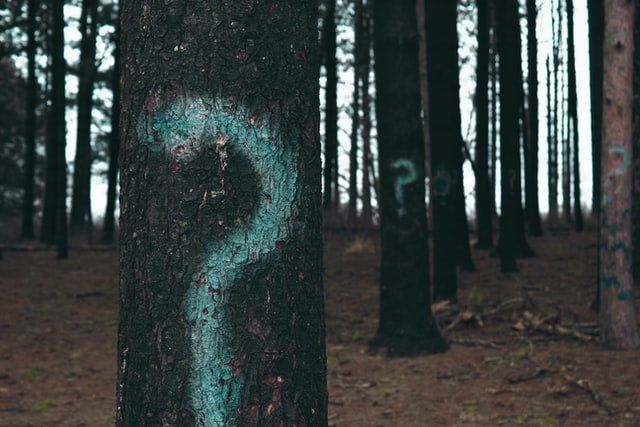The Big Question
Who is Jesus in a Covid-19 world?

Who do you say Jesus is? Some of us have had more time than usual to ponder over the past few months, but when was the last time you actually asked yourself who Jesus is?
Matthew 16:13-20 records Jesus questioning his disciples asking ‘Who do you say I am?’
At first sight this question may seem like a simple one, with a relatively simple answer. And I am sure that many of us could parrot a suitable Sunday school response.
But Jesus didn’t intend this to be an easy question - back in the first century when he first asked it or now.
Did you know that the gospels record over 150 questions that Jesus asked his followers and others during his ministry? And they are some of the most profound and challenging questions ever asked of humanity. Questions like who then is your neighbour? Where is your faith? And do you love me? In fact he often answered other questions with a question.
Jesus never gave people pat answers or short cut their discovery process, and he used questions to make us really reflect on his teaching and his life and what it means for us. And at the centre of his ministry and all his teaching - lies this question the most profound and searching of all? Because this question ‘who do you say I am’ is all about us.
Jesus knew exactly who he was, there was no confusion in his mind and he doesn’t ask the question for his benefit - this a question for us – intended to prompt our reflection and exploration.
Jesus’s question comes in two parts. First of all in this account from Matthew, Jesus asks his gathered disciples, ‘who do others say the son of man is?’
Jesus is called by many names in the Bible but the title the Son of Man was the one that Jesus most commonly applied to himself. And the name the son of man goes back to the Old Testament to the prophecies of Daniel who in a vision saw one like the Son of Man descending from heaven and to the Psalms which refer to the son of man who God has raised up for himself.
So by using this title Jesus indicates that he is perfectly clear about this own identity and relationship to God. But he was also conscious that as he had travelled throughout Palestine, preaching, challenging and performing miracles that he had created quite a stir and that there were plenty of theories flying around about him.
So first of all he wanted to get this issue out of the way.
During the centuries of oppression suffered by the Israelites, many had risen up to proclaim the word of God but all had ultimately fallen, and it is to these figures from the past that their thoughts first turned.
When Jesus asked the disciples who others said he was, they pointed to first John the Baptist who was murdered by Herod, John was such a charismatic and also enigmatic character that many, including Herod, thought they might see him again.
Some thought he was the prophet Elijah, the worker of miracles who Malachi prophesied would be seen again before the ‘great and terrible day of Yahweh’ comes (Malachi 4:5). And others that Jesus was Jeramiah who has opposed the religious leaders in Jerusalem and predicted the destruction of the temple which came after Jesus’s death. And for good measure they add - or one of the other prophets.
But after asking the disciples what others thought, Jesus then asks them directly ‘ But who do YOU say I am’
I don’t know about you but when I read this I can almost imagine his piercing gaze as he looked into the eyes of his followers, his expression saying that isn’t good enough, I need to know what YOU personally believe about me from the bottom of your heart and soul. Who do you Peter, James John, etc personally believe and say that that I am?
It is a deceptively simple question with enormous depth and ramifications and this question still applies today. It is not enough for us to be able to parrot Sunday School style responses, to just recite the liturgy here in church that others have told us provide the correct answer.
His question – ‘who do YOU say I am?’ is directed to each and every one of us personally today.
And Jesus’s question isn’t hypothetical or abstract – and then as now the answer has as historical context and perspective.
In the first century AD, the question was loaded with expectations set by the Old Testament prophets. And even Peter’s answer ‘you are the messiah – the son of the living God’ was fraught with complexity.
In first century Judaism there was no single understanding of the word the ‘messiah’.
The Hebrew ‘mashiach’, from which we get the word ‘messiah’ means anointed which in Greek is translated as ‘Christ’. And many thought that the Messiah or Christ was going to be a warrior or king who would release his people from Roman oppression and rule. And it was only in Holy Week, that it became clearer what kind of Messiah Jesus would turn out to be.
So Peter gives the correct answer but the true meaning of Jesus’s identity as the Messiah was yet to be revealed. In fact his answer only raised yet more questions. In many ways what Peter says is only the beginning of a journey into knowing Jesus that each of us is called to undertake. And Jesus’s question continues to resonate down throughout history as he asks us all in our different contexts - who do you say I am?
It isn’t enough to be able to say who others say Jesus is, we need to ask ourselves who Jesus is to us today. And the answer wont’ be easy because life is not always easy. But we need to be able to answer this for ourselves every day of our life and in whatever our circumstances we may face.
So who do we say Jesus is in the face of a global pandemic that has rocked our sense of security to the core?
Who do we say Jesus is when we feel isolated and cut off from our community by Covid-19?
Who do we say Jesus is when we feel nervous to leave the house (as I know I have)?
Who do we say Jesus is when we are worried about the future?
Who do we say Jesus is when we lose a loved one?
Who do we say Jesus is when we are faced with questions with no easy answers?
But also who do we say Jesus is when all seems to be right with the world?
Who do we say Jesus is when we feel comfortable and don’t’ think we need him?
And who do we say Jesus is when all our efforts seem to be paying off and we are tempted to forget that all good things come from God?
The answer wont’ necessarily be easy and is likely to challenge us to the core. Because there is nothing safe about this question.
Let’s face it there was nothing safe about Jesus and he knew that this question would force us to dig deep, to really work out what we believe at the deepest level. And the answer to this question has implications for how we live our lives.
When Peter identifies Jesus as the Messiah he says to him. ‘Blessed are you, Simon Son of Jonah! For flesh and blood has not revealed this to you, but my father in heaven.’
Jesus’s true identity cannot be received second hand from others, but only through our personal relationship with God through him. And the closer we come to him, the clearer the answer will be. And the clearer the answer, the firmer our foundation. And Jesus’s identity becomes the rock on which our lives our built individually and collectively as his church.
So whatever your circumstances, I encourage you to honestly ask yourself Jesus’s question that has shaped so many lives down the centuries ‘Who do you say I am? And to let the answer be the rock that you build your life upon.
Kate Nicholas’s best-selling memoir Sea Changed (shortlisted as Christian Biography of the Year 2017) and her latest book Sea Changed: A Companion Guide – Living a Transformed Life are available at Christian bookstores and online at eden.co.uk, kooroong.com and Amazon worldwide.
Have you ever thought about writing a book about your walk with God - but just don’t know where to start? Then check out my online course Write Your Soul Story: How to write your autobiography or memoir at https://www.katenicholas.co.uk/mysoulsstory
